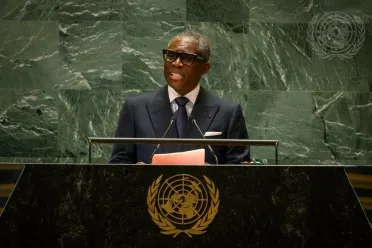Statement
Statement summary
TEODORO NGUEMA OBIANG MANGUE, Vice-President of Equatorial Guinea, said that his country remains unwavering in its position on ending conflict and establishing peace through preventative diplomacy. He called on all parties to conflicts — either directly or by proxy for economic or neocolonial interests — to choose inclusive negotiations. The proliferation of conflict is “further proof of the obsolescence incapacity, and inefficiency of the United Nations Security Council today”. Instead of solving conflicts, the Council is the place where geostrategic interests are played out, effectively blocking resolution to conflict and prolonging the suffering of concerned populations. The Security Council must end its “obsolete composition which dates back to 1945” that disadvantages Africa as it lacks a permanent seat. In line with the Ezulwini Consensus and the Sirte Declaration, the continent has called for this injustice to be corrected for the past 20 years, he said, reiterating demands for two permanent seats with all their commensurate privileges and five additional non-permanent seats.
Voicing deep concern over the situation in the Sahel, he noted that interference, pressure and blockades applied on countries of the Global South by “some other countries” causes the instability in the region today and prevents African countries from prosperity. While no country is perfect, some act as judges, intervening in the domestic affairs of other countries. All nations have the right to decide on their bi-lateral partners and agreements, he stressed. In that vein, he spotlighted the decades-long economic, commercial and financial embargo on Cuba, calling for it to be lifted and for the country to be taken off the “infamous list of countries that allegedly sponsor terrorism”. The embargo goes against the spirit of the Pact for the Future, advocating to leave no one behind, he said.
“African countries can become major actors in global supply chains”, he said noting that the continent has stores of raw materials needed in the technology sector and its own markets. Africa, therefore, deserves priority attention in development support, in addition to financing to achieve the SDGs and the African Union’s Agenda 2063. “Commitments to finance sustainable development must be honoured,” he urged. Committed to the protection of human rights globally and sounding the alarm over the systematic violation of them in conflict zones, he voiced grave concern over the crisis in Haiti. A thorough analysis of the root causes for that country’s “chronic” situation is required to find a stable solution, he said, proposing a UN international conference for Haiti.
Teodoro Nguema Obiang Mangue, Vice President of Equatorial Guinea, also referred to the Ezulweni Consensus as well as the Sirte Declaration.
In line with these positions, Africa has called for this injustice to be corrected for the past two decades, he said, reiterating demands for two permanent seats with all their commensurate privileges alongside five additional non-permanent seats.
He pointed that the proliferation of conflicts is “further proof of the obsolescence incapacity, and inefficiency of the UN Security Council today”, arguing that instead of solving conflicts, the Council is the place where geostrategic interests are played out.
These are resulting in conflicts being left unresolved and prolonged suffering of those affected.
The Security Council must end its “obsolete composition which dates back to 1945” that disadvantages Africa, he declared.
Full statement
Read the full statement, in PDF format.
Photo

Previous sessions
Access the statements from previous sessions.
